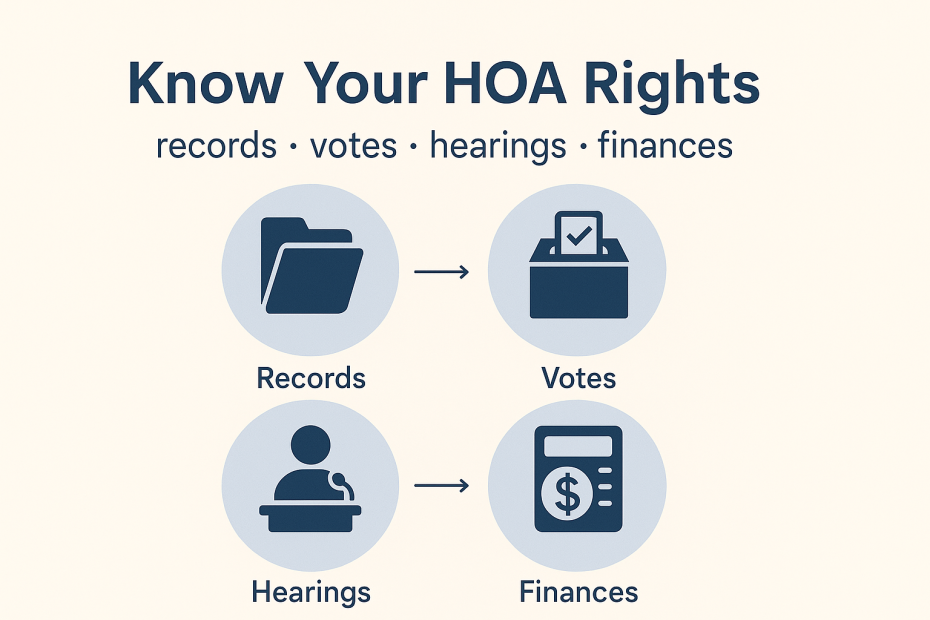
Last updated: August 24, 2025
Buying into an HOA makes you a member with duties and rights. This guide turns legal terms into plain steps. You’ll see how to get documents, vote, dispute fines, and review money matters. We also explain hearings and amenity access. Use the checklists and examples to act fast and stay fair. It’s your community—learn the rules and protect your place with hoa homeowner rights.
Answer key: You have clear rights to records, notice-and-hearing, fair elections, equal amenity access, and transparent finances—use them with written requests and deadlines.
TL;DR
- Request CC&Rs, bylaws, minutes, budgets, and reserve info in writing.
- Elections require notice, secure ballots, and nominations per bylaws.
- Before fines: written notice, cure window, and a fair hearing.
- Budgets and reserves should be transparent and compared to prior actuals.
- Amenity access must be consistent and non-discriminatory.
Your rights at a glance
- Records: See CC&Rs, bylaws, rules, minutes, budgets, reserve info.
- Democracy: Receive election notices, vote, and run for the board.
- Due process: Written notice and a fair hearing before fines or penalties.
- Transparency: Consistent, equal enforcement and clear communication.
- Amenities: Equal access under reasonable, non-discriminatory rules.
Quick Q: Do rights vary by state? Yes. Core ideas are similar, but timelines and details come from your state law and CC&Rs.
Access governing documents
Ask for CC&Rs (covenants), bylaws (board structure), rules, approved minutes, and policies. Keep everything searchable and shareable with RunHOA Documents.
Vote and run for the board
Elections need notice, quorum, and secure ballots. If your community allows it, use RunHOA e-Voting for proxies and ballot tracking. Candidates follow nomination rules in the bylaws.
Dispute violations and fines
Due process means a written notice, reasonable time to cure, and a hearing before penalties. Manage notices, photos, and decisions in RunHOA Violations.
See budgets and financials
Review approved budgets, actuals, and reserve studies. Clear reports and categories live in RunHOA Accounting. Track assessments and late fees in RunHOA Dues.
Use amenities fairly
Rules must be reasonable and applied the same to everyone. Check posted hours and reservation policies. Ask for accommodations when needed.
Practical steps to use your hoa homeowner rights
- Write requests and keep replies together; date every message.
- Use clear subjects like “Records Request – 2025-08-24.”
- Quote the exact rule or page you rely on.
- Add important dates to the RunHOA Calendar so nothing slips.
- Follow up every 7–10 days until resolved.
Quick Q: Do I need a lawyer? Not usually for routine issues. Consider one for large fines or legal threats.
Examples & table
| Right | What’s included | Where to find | Typical timing |
|---|---|---|---|
| Records access | CC&Rs, bylaws, minutes, budgets, reserves | RunHOA Documents | 5–10 business days |
| Elections | Notice, nominations, secure ballots, proxies/e-voting | RunHOA e-Voting | 30+ days’ notice common |
| Hearing before fines | Written notice, cure window, board hearing | RunHOA Violations | 7–15 days to cure |
| Financial transparency | Budgets, actuals, reserves, collections | RunHOA Accounting • RunHOA Dues | Monthly/quarterly reports |
Key numbers
- 5–10 business days: common records response window.
- 7–15 days: typical violation “cure” period before fines.
- 30+ days: usual election notice lead time.
- 15–40%: many budgets target reserves in this range (varies).
HowTo: request records the right way
- List what you need (e.g., minutes Jan–Jun 2025; latest reserve study).
- Send a dated, polite request via your portal or email.
- Offer digital inspection; save PDFs in your drive.
- Calendar a follow-up in 7 business days.
- Escalate to the board chair if the deadline passes.
HowTo: dispute a violation or fine
- Read the notice and highlight the cited rule and date.
- Collect evidence (photos, approvals, emails).
- Request a hearing in writing; propose two dates.
- Bring a short statement and your exhibits.
- Ask for the decision in writing and a cure plan, if needed.
FAQ
Can an HOA deny my records request? It can limit scope, set inspection times, or charge reasonable copy fees. It should not deny core items like CC&Rs, bylaws, approved minutes, and budgets. If blocked, restate the request, cite governing documents, and escalate to the board chair.
Can I be fined without a hearing? In most communities, no. You must receive written notice and a chance to be heard. If a fine appears without this, ask for the policy, request a hearing, and pause payment until due process happens.
How do I vote if I can’t attend the meeting? Use proxy or absentee ballots if allowed. Many HOAs enable secure online voting. Check your meeting notice for instructions and deadlines.
What if the board enforces rules unevenly? Document examples. Ask for the written enforcement policy. Uneven treatment can be challenged. Start with a respectful letter and request a board agenda slot.
Are amenities rights affected by unpaid dues? Some HOAs may suspend access for serious delinquency if their policy allows it. You must receive notice first. Payment plans can restore access.
Do more with RunHOA
- Keep documents organized and searchable with RunHOA Documents.
- Make elections easier with RunHOA e-Voting.
References
- HUD — Fair Housing Act
- CFPB — Debt collection rights
- Nolo — Understanding HOAs
- Community Associations Institute (CAI)
